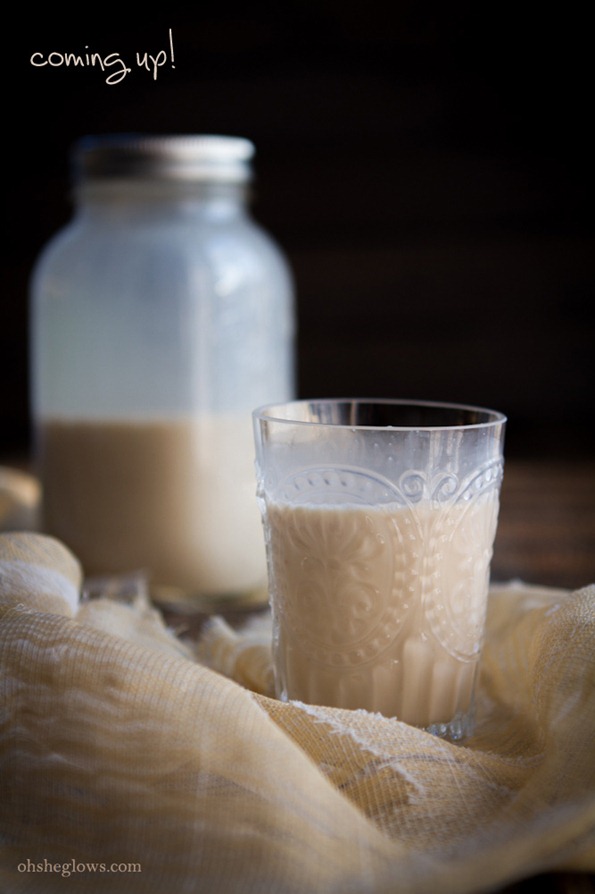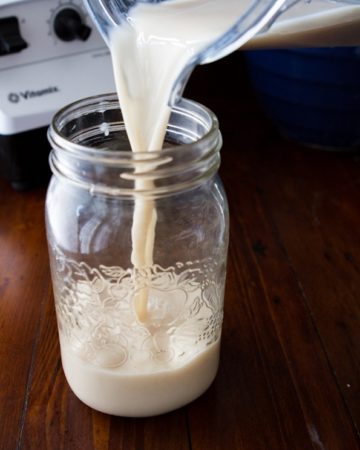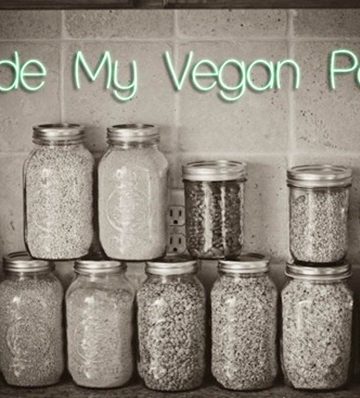In my post, Replacing Dairy Milk, a few of you commented that you avoid several brands of non-dairy milk because they contain an ingredient called carrageenan. This was the first time I had heard anything about this ingredient, or at least the first time I took any notice. I assumed that it was a safe ingredient, especially because it is found in some organic products. But as we know, just because something is allowed in our food does not mean it’s necessarily good for us. It’s frustrating as a consumer to believe we are buying quality ingredients only to find out they could be harmful to our health.
Anyway, I knew I had to look into this further. And I don’t like what I’m reading. In fact, I’m pretty ticked off.
At first blush, carrageenan sounds seemingly harmless – it’s derived from red seaweed and is used as a thickener, stabilizer, and/or emulsifier in many dairy (sour cream, yogurt, ice cream, etc), dairy alternatives (non-dairy milk, non-dairy cheese, etc), and deli meat products. As it turns out, research links carrageenan to gastrointestinal inflammation, lesions, and even colon cancer in animals. Individuals with Inflammatory Bowel Disease or other gastrointestinal disorders are cautioned to avoid this ingredient as it can make symptoms – and inflammation – even worse. As someone who has suffered from IBS for many years, I was shocked to find this information out. This was the first I had heard of it.
For a review of the research on carrageenan see this PDF document by Cornucopia.org. Please look into this ingredient and make your own informed opinion.
For a long and detailed list of carrageenan in many dairy and non-dairy food products (and safe products as well), please see this Cornucopia shopping guide – it’s extremely helpful. You might be surprised at many of the brands that contain this ingredient. I know I sure was.
I realize there is no conclusive evidence with regard to human consumption of this ingredient, but I’m not willing to take that risk when there are other options, especially because I have suffered from IBS on and off for half my life. I will no longer support President’s Choice Organic Almond Milk or Blue Diamond’s Almond Breeze – two of several brands that contain carrageenan. Instead, I’m going to purchase Whole Foods 365 organic almond milk which is one of the carrageenan-free brands or I will make my own milk at home (more on this in my next post). I’m anxious to see if I notice a difference.
For the complete list of carrageenan-free products, be sure to check out the shopping guide linked above.
As I mentioned in my intro post, we have a lot to learn from each other and this is a perfect example. I’m thankful for all of you sharing your experiences and knowledge in the comments. I’m learning too. I hope that by writing about this today, more awareness is brought to this ingredient. With other thickeners/emulsifiers readily available (such as organic guar gum and organic locust bean gum) there is no excuse for food businesses to continue to put carrageenan into our food at the potential risk of our health.

I was already planning a post on homemade milk, but now it seems even more timely and appropriate. Easy, homemade milk coming on up. I think you’ll really like the ingredients list in this one.
Have you heard anything about carrageenan before? Do you avoid it on labels or will you in the future?





Hey people, this is just another scare tactic started by the huge Dairy Association (funded by our tax dollars through the USDA) to scare the millions of people who are turning to dairy alternatives. There is SO much money and political maneuvering behind this claim. Please don’t be fooled. Studies have been done feeding large quantities of the organic gums that are used to hold together gluten-free products, and they have all caused intestinal inflammation and serious illness to the rats used in the study also. Any ingredient that has been isolated and fed in large quantities to an animal is not good!
Carrageenan is an extract from seaweed, relax, unless you plan on getting bottles of it and forcing yourself to eat it 3 times per. day.
I actually found carrageenan to cause issues via an elimination diet before reading anything about it. I thought the problem was guar gum for a long time because the two are so frequently used together. It is possible that I am more sensitive to anything that may cause inflammation because I have RA and my inflammation is generally higher than normal but it causes me all sorts of digestive issues. I was getting it in the cream for my coffee which was enough to cause a reaction for me (1-2 cups per day only, so maximum a quarter cup of cream). I don’t see why dairy would use carrageenan as a scare tactic when it’s in virtually every mass market cream/ice cream right along with the dairy substitutes. I switched to cream from a local dairy that does not add anything and all my symptoms went away.
I am a reasonably healthy person. I have no underlying health conditions–I don’t have IBS, I’m not lactose intolerant, and I don’t have RA like ‘Ann’ (previous reply from 6 years ago). However, about 5 years ago, I started to develop intestinal issues. I eventually connected it to happening every afternoon at work that I had a yogurt as my afternoon snack. I thought I was developing a lactose sensitivity despite enjoying dairy products my whole life. Then I went onto Google and searched ‘sudden onset of lactose sensitivity or something else?’ and a bunch of search results came back about this thing called carrageenan. I had never heard of it before! So, I decided to do an experiment. Instead of buying the yogurt I always did, which contained carrageenan, I found a brand that didn’t contain carrageenan and ate that for a week. My afternoon intestinal issues after eating yogurt stopped immediately. I then started to look at other dairy products that I consumed regularly and I was amazed by the number of them that contained carrageenan. Since then, I religiously read ingredient labels and do not buy anything with carrageenan in it and my intestinal issues have not returned, yet I’m still consuming dairy products regularly–just not ones that contain carrageenan. I think you would agree that a small 100g container of yogurt would contain much less carrageenan than a bottle of it, consumed 3x/day and yet, it affected me immediately after consumption. Sadly, I’m finding that more and more products seem to contain carrageenan these days as it’s cheaper than other stabilizers and we all know that big food brands are always looking to increase profits any way they can! There have been petitions to get the FDA to stop allowing carrageenan to be put in foods we buy but unfortunately, nothing has changed yet. Here’s hoping it does soon because I really like ice cream but, seemingly, 98% of ice cream brands contain carrageenan. :(
It makes me vomit when I eat somthing with it in it not knowing what is in it
Carrageenan is a food additive. It is an indigestible polysaccharide extracted from red algae (seaweed), added to foods as a gelling http://dailycome.com/carrageenan-allergy-symptoms-with-foods-and-products/
well, my first batch is in the fridge, I think it tastes pretty darn good! It also has the added benefit of oats, which, as everyone knows is helpful for lowering the dreaded high clorestol.
Thanks for the recipe.
I can instantly tell if something has carrageenan in it. I get intestinal cramping from it. I didn’t realize it was this ingredient until I started looking at the milk alternatives that were giving me this problem and saw that carrageenan was the main denominator.
A round of applause for your article post.Thanks Again. Much obliged.
Possibly Almond Breeze changed their formulation. The last few in my fridge have no carrageenan. This is Original Unsweetened.
When I found out that I’m allergic to dairy (and eggs), I started drinking plant-based milks. That’s when I started experiencing stomach troubles: cramps, bloating, tenderness, basically just overall unease. A friend asked me if the milks contained carrageenan. Yup, they did. I did research online, and found it to be a natural substance – seaweed – that acts as an emulsifier/binding agent. Eggs perform the same when baking – their function is to get thick and sticky to hold ingredients together. Well, when carrageenan gets into my digestive tract, it does the same thing. I know that’s what it is because I’ve done numerous elimination tests on myself. Get the facts, then act accordingly. If it doesn’t bother you, good. If it does bother you, stop consuming it, also good. Just because it’s a natural substance, it doesn’t mean it’s good for me – it’s probably not the carrageenan itself, but its interaction with stomach acids, just like what happens with baking. I think you just have to listen to your body in the end. Thank you.
does anyone know if there’s another name for carrageenan used in ingredient listings? i’ve read in articles that blue diamond original flavored almond milk does contain carrageenan but carrageenan is not on the packaging’s ingredient list. thanks for the help!
As someone who has studied seaweeds for years I have to tell you, carrageenan is not derived from seaweed, it is seaweed. As natural as grass or leaves on a tree. Sure they refine it like you have down when making your home made oat milk, but there is not a lot that needs to be done to it to make it work its magic. There are many nutritional benefits to carrageenan and I’d suggest you look then up and read a few scientifically proved articles before writing posts such as the above. Very misleading. Have you or your readers heard of Google scholar? Google it, and then Google benefits of carrageenan. Then Google dangers of carrageenan. Then do the same on any other common food ingredient – Baking soda, oats, dates…. In sure you will find scientifically pros and cons to each. But at least then you will be somewhat qualified to share your opinion online. In my opinion. Which I’m not saying is right. But hey, we’re all entitled to an opinion no matter how wrong it is, right???
I found a link about carrageenan from Food Science Matters that supports the benifits and safety of carrageenan. It says it has been used for over a century all over the world and can even be made from seawead, water, salt and alcohol in your own kitchen! It is also internationally approved as safe. I also wonder about the ethicacy of some studies and what agency paid for them, noting that dairy milk commercials have scoffed at products containing carrageenan. I hope that the product is safe because as a vegan it has been an important ingredient in many recipes, plus it is apparently in a surprising amount of foods, both vegan and non vegan. I also have a lot of Irish Moss on hand which is supposed to be similar to use as a thickener but do not know if that is in the same category in the study. We eat few processed foods and I would not be able to get my husband to drink almond milk! The soy milk he likes has carrageenan. He is just starting a semi vegan diet and thanks to your Oh She Glows cookbook (the best recipes for turning people on to vegan foods) he is now eating the same foods as I but to a limit. We love your recipes and I have bought the Oh She Glows cookbook as gifts. Here is the link about Carrageenan. For me it will remain a sometimes ingredient in cooking but I am going to research Irish Moss and may substitute with that.
http://www.foodsciencematters.com/faq/
My daughter bought oh she glows everyday and we are having many vegetarian options. I REALLY wish you had nutritional content for each of your recipes. As a NEW vegetarian, I am concerned with getting enough protein. I have no idea with your recipes
Hi Laura, I hope you and your daughter are enjoying the new cookbook! With my first, The Oh She Glows Cookbook, I received many requests for nutritional information, so I’m happy to let you know that for Oh She Glows Every Day you can find all the nutritional info here: http://cdn.ohsheglows.com/docs/OhSheGlows_Every_Day_Nutrition_Info.pdf. I hope that helps!
I have, for years, understood carrageenan to be bad for our consumption, however I am just now reading in Miyoko Schinner’s Artisan Vegan Cheese book (page 134), that the “ill effects were observed in animal studies that used a non-food-grade form of carrageenan altered by the addition of an acid. Food-grade carrageenan hasn’t been shown to be carcinogenic…”
Do you know anything more about this?
I became an unwilling experiment of carrageenan when I tried a diet that didn’t allow dairy, sugar or sugar substitutes. It was recommended to try almond milk instead of milk. I’m diabetic . After a week I couldn’t undrrstand why my blood sugars were worse than before I started . So I started looking up the ingredients in the almond milk. When I got to carrageenan. I found several studies that said it can cause insulin resistance . I won’t eat anything that contains carrageenan. It’s not only in human food. It’s in pet food too.
Recent studies also have linked carrageenan to insulin resistance and the American Diabetic Association (and our naturopath!) now recommend diabetics or those with insulin resistance to avoid any products with carrageenan, regardless of calorie/carbohydrate content. Just because it’s derived from seaweed doesn’t mean it’s healthy!
It’s used as a thickener in a lot of things; why is it in my 2% milk? whipping cream? coffee cream? light cream? Is there any way to buy dairy products without it?
I find carrageenan interesting because demonizing it can cause people to feel lost or limited when choosing plant based products such as nut milks and plant based yogurts.
I am doing a deep dive on this topic for a course I am taking and it looks like a lot of the research implicating a risk in carrageenan consumption is actually using poligeenan, a degraded version of carrageenen which is not and never has been used as a food additive. It is the “non food grade form of carrageenan” that a person a few comments up from this one is referring to. The studies that found ulcerations in the GI tract were using the poligeenan form and were not replicated in other animal studies. And that despite this being clear, much of public suspicion around carrageenan is fuelled from these studies. Further, carrageenan has not been found to pass through the epithelium of the GI tract according to one study. Even if it does help some people in a case by case basis, I think it is important to acknowledge these points.
There is a difference between degraded and kappa carrageenan, the later being the better option. As you say, there’s no conclusive evidence to back up these studies. Everything in moderation.
Carrageenan is another name for hidden MSG which is a neurotoxin! The FDA says if it is 100% MSG they have to label it as monosodium glutamate. If it is 99% or less they can hide it legally under 40 different names. It is shocking and I have severe reactions to it. It destroys your retina, your nervous system And your G.I. tract, as well as causing anxiety!…….but the government allows it. I would love to be able to communicate with people that have reactions to this and know that it is a poison.